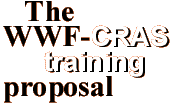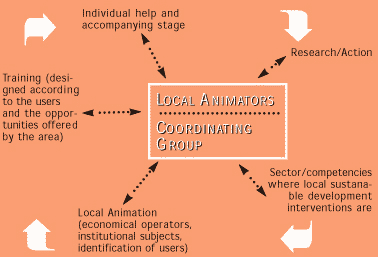|

The methodology adopted with ADAPT and proposed here as a repeatable
model represents the summary
of various remarks developed in different disciplinary contexts:
economical, sociological and pedagogical contexts dealing with eco-development,
local development and the features of labour market and flexibility
of skills and competencies. As a matter of fact, the limited boundaries
of reasoning within separated disciplinary contexts appear more
and more clearly.
This method is proposed as a
summary and action planning of the notions developed inside the
various disciplinary contexts. It also aims at breaking
off with an idea of vocational training which is now
obsolete (and proposed, as it was said before, with the present
European Social Fundís programmes) and creating a new model which
should be able to seize changes and transformations. The repeatable
elements which mark the model proposed are the following:
- Enhance
local resources (work on the existing resources and,
at the same time, enhance them). When we talk about resources
here, we mean both competencies already existing and local (tacit
and explicit) skills and knowledge, environmental resources, vocations
of the area, etc. The same intervention philosophy is adopted
both in finding out the project sectors/ideas and in the kind
of didactic project: elaborate and guide
the (tacit and explicit) proposals offered by the area, enhance
the resources already existing (ideas, competencies, natural resources,
etc.); fill the gaps through
a kind of training purposely adjusted for a special kind of users.
The research-intervention and local animation stages are those
allowing to identify these resources.
Vocational training becomes the container where the elements that
came out during the previous stages are elaborated and examined
closely.
In this way, vocational training is qualified
as a wide growth process of
the local productive structure and of the individual competencies
and/or a process leading to the creation of new business initiatives
and also as an opportunity to create a kind of development which
is compatible with the environment.
Substantially, the training project should
activate a process starting from the identification
of development opportunities and from the enhancement of resources
offered by the area through the designing of specific
local development projects; it should involve a group
of people motivated and interested in the same projects (this
is a very important aspect for successful training activities!);
it should also remain tightly linked to the area both through
the involvement of local stakeholders
and witnesses during the training and accompanying the implementation
of projects for which a (technical) support is foreseen in its
starting stage.
- Flexible
didactic programmes which should be adjusted to the
needs of participants and based on the analysis of the needs to
have competencies in the implementation of projectís objectives.
- Direct
contact with the users and their engagement according
to the development projects to be implemented.
- The
tutorís main role is to animate the area at a local
level and design training programmes; they guarantee the connection
and direct contact with the users. The method adjusted with ADAPT
is focused on the role played by local teams, i.e. people living
and working in the area and becoming a connection between the
area, the group of participants and the group coordinating and
supplying technical/scientific support to all project activities.
These people guarantee the
connection and coherence between the local resources to be enhanced,
the opportunities to be exploited and turned into local development
ideas and competency needs of participants. Moreover, they manage
training activities in the framework of their tutoring function,
a key function which should
design - together with the coordinating group - didactic activities
and re-adjust them during the training according to the progress
of activities and to the participantsí attitudes. Finally, the
tutor should design and support the final intervention stage,
i.e. assisting and accompanying business activities.
- Organization
of practical training sessions. This kind of activities
is very important for a training
programme, especially if it is addressed to adults. As a matter
of fact, the main learning process for adults is based on direct
experience, therefore, practice sessions are one of the activities
with the highest degree of learning within a training experience.
Therefore, these activities should be well designed for an active
participation of trainees into the "production process" which
is the training object. If training action is large enough, it
would be better to design two kinds of practical activities: orientation
activities and more practical activities.
- Continuous
comparisons between the different contexts involved
in the project. If the project foresees the simultaneous implementation
of training activities in different areas (several training courses)
the comparison between these different contexts becomes an opportunity
for common growth and stimulates the participants to realize personal
projects.
- Creation
of an after-course accompanying stage. Vocational training
actions usually finish when theory courses are over. Since the
model proposed is outlined as a process formed by a series of
actions, the theory stage should be followed by an individual
or group support and accompanying stage. The various stages of
this project can be designed together with the participants during
the final theory stage, through the writing of a working plan
which includes the subjects and modalities for the next interventions.
This can be done through the interventions of experts on specific
subjects, through consulting, tutoring the start of new business
activities, etc..
|



|



